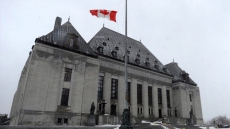SASKATOON — Michael Wileniec used to walk across the street from his Saskatoon high school several times a day and hang out with the rest of the smokers, although he was the only one puffing on prescribed medical marijuana.
His routine ended earlier this year when school officials told him he could not smoke prescribed weed on school grounds, nor could he attend classes while under its influence. Wileniec fought the ruling before the school board and lost.
"We got a reply back from the superintendent saying there's no need for medical marijuana in the school and that a student under medical marijuana is a safety hazard to the faculty," the 21-year-old said in an interview.
Wileniec has filed a human rights complaint and lawyers believe he's the first student in Canada to do so.
The case is not likely to be settled by the time Wileniec graduates from Nutana Collegiate at the end of June. No date has been set for mediation or a tribunal. But he says it's an important fight that he'll continue for others.
"So that the next kid that ends up being prescribed marijuana doesn't have to go through the same thing."
Wileniec was seven when he was diagnosed with hereditary multiple exostoses, a disease in which benign tumours grow on his bones and into his joints, often pinching nerves. He's in constant pain.
Medical treatments have delayed his progress in school. That's why he enrolled three years ago at Nutana, a community school that focuses on academic upgrading and career training.
It was about that time that his doctor gave him a prescription for medical marijuana. Wileniec says pot works better for him than painkillers, dulling the agony while allowing him to focus on classwork.
The school was OK with it at first, Wileniec says, provided he smoked off grounds. But when he took an 18-month hiatus to have his left leg lengthened, a painful process involving screws, he returned to find new officials and new rules.
His lawyer, Heather Funk, says it's obvious her client is being discriminated against, since other students are allowed to take medications at school. Wileniec's family had suggested he use a vaporizer in the nurse's office, making the marijuana virtually odourless. The school said no.
A spokeswoman with Saskatoon Public Schools says she can't comment on a specific case and the division addresses medical needs on a "case-by-case basis."
Health Canada says roughly 40,000 people are authorized to possess medical marijuana. It doesn't record how many are students, although most are men between 41 and 60.
Kirk Tousaw, a British Columbia lawyer who advocates for medical marijuana patients, is aware of other students who have run into problems with school boards over the drug. He doesn't think anyone else has filed a human rights complaint.
A ruling in Wileniec's case wouldn't set a precedent outside Saskatchewan, he says, but it would be "persuasive" elsewhere.
"It would be ludicrous to suggest that a medicine that's prescribed expressly for the purpose of allowing you to participate in school — that you somehow can't come to school under the influence of the medicine," says Tousaw.
"It's prejudice. It's discrimination. And it's marginalization of someone because of the choice of their medicine. I think that's just wrong."
Noah Kirkman has been allowed to smoke his medical pot at Calgary's Western High School since last year.
The 17-year-old suffers from Tourette's syndrome and Attention Deficit Hyperactivity Disorder and says marijuana stops his ticks and keeps him focused.
The school has been great, says the Grade 11 student, who used to head to the principal's office with his vaporizer to medicate. Now he goes into the staff washroom.
University of Waterloo student Jonathan Zaid, 22, who takes medical marijuana for a syndrome called new daily persistent headache, recently won a battle to have his student health plan pay for the drug.
He says being medicated at school hasn't been an issue and he's helping officials craft a policy about the use of medical marijuana on campus.



